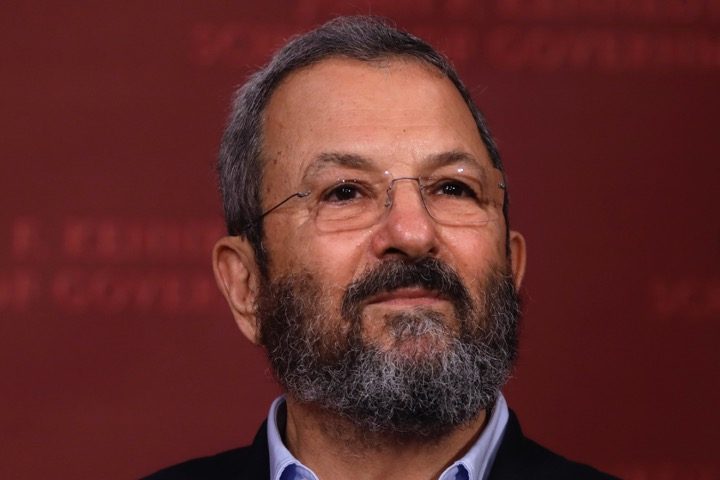
The Israeli military only has weeks to annihilate Hamas before Western governments withdraw their backing for Israel’s Gaza operations, former Prime Minister Ehud Barak told news outlet Politico on November 7.
“Listen to the public tone — and behind doors it is a little bit more explicit,” opined the 81-year-old, who also served as defense minister and a general with the Israel Defense Forces (IDF).
“We are losing public opinion in Europe and in a week or two we’ll start to lose governments in Europe,” Barak admitted. “And after another week the friction with the Americans will emerge to the surface.”
Although U.S. officials have been calling for “humanitarian pauses” in Gaza, they have not publicly declared a withdrawal of Washington’s support. The government of Prime Minister Benjamin Netanyahu has refused to cease hostilities. Barak said he thinks Israel will have to “come to terms with the American demands within the next two or three weeks, probably less.”
“You can see the window is closing. It’s clear we are heading towards friction with the Americans about the offensive. America cannot dictate to Israel what to do. But we cannot ignore them,” he acknowledged.
Nonetheless, Barak posited that it would take the IDF months, or even a year, to get Hamas out of Gaza. Israel has made eradicating Hamas its main goal since the Palestinian terrorist group killed hundreds of civilians during an incursion on October 7.
Subsequently, the IDF intensely bombed Gaza as part of its strategy to extirpate Hamas, with Gaza officials reporting on November 6 that the death toll in the Palestinian enclave had exceeded 10,000.
New evidence of shifting stances in Europe regarding Israel’s actions in Gaza surfaced when Belgian Prime Minister Alexander De Croo slammed Israel’s military tactics on November 6.
“Bombing an entire refugee camp with the intention of taking out one terrorist, I don’t think you can say that is proportional,” De Croo said. “It is a bridge too far.”
Last week, the IDF struck various Palestinian refugee camps, including the large Jabalia settlement in northern Gaza, which Israel had considered an evacuation zone. Israeli military spokesman Richard Hecht portrayed the civilian casualties from Israeli strikes as “the tragedy of war” when questioned by CNN host Wolf Blitzer last week.
Barak served as Israel’s prime minister from 1999 to 2001 and represented his nation during the U.S.-mediated 2000 Camp David Summit with Yasser Arafat, the leader of the Palestine Liberation Organization.
Meanwhile, lower- and mid-level diplomats at the U.S. State Department have urged the administration of President Joe Biden to denounce Israel’s bombing of civilians and insist on a ceasefire in Gaza, based on a leaked memo seen by Politico and reported on November 6. This memo is one of the most recent indicators of division within the State Department over Israel.
Politico reported that the memo urged Secretary of State Antony Blinken and other senior diplomats to publicly demand that Israel agree to a ceasefire, and to align their public and private comments on the conflict.
Condemning Israel in private but not in public “contributes to regional public perceptions that the United States is a biased and dishonest actor, which at best does not advance, and at worst harms, US interests worldwide,” the memo reportedly indicated.
“We must publicly criticize Israel’s violations of international norms such as failure to limit offensive operations to legitimate military targets,” the memo added. “When Israel supports settler violence and illegal land seizures or employs excessive use of force against Palestinians, we must communicate publicly that this goes against our American values so that Israel does not act with impunity.”
The memo was considered “sensitive but unclassified,” Politico pointed out, elaborating that it remained uncertain as to how many people put their signatures to it, and whether it was submitted to the department’s “Dissent Channel,” which acts as a platform for people to voice doubts about policy moves.
Various similar memos have been shared since the Israel-Hamas war began on October 7, with Blinken meeting with dissenting staffers late last month, HuffPost reported. A week before Blinken’s purported meeting, the State Department’s arms-transfer chief resigned in protest, declaring in his resignation letter that Washington’s hurry to weaponize Israel was “shortsighted, destructive, unjust, and contradictory to the very values that we publicly espouse.”
Although Blinken has slammed incidents of violence against Palestinians by Jewish settlers, he has spoken more ambiguously about the rising civilian death toll in Gaza.
“We’ve engaged the Israelis on steps that they can take to minimize civilian casualties,” he said.
Notwithstanding an overwhelming vote for a ceasefire at the UN General Assembly late last month, Blinken has repeatedly dismissed calls to cease the Israeli operation. Any halt in the fighting would give Hamas time to “regroup and repeat what it did on October 7,” Blinken contended, alluding to Hamas’ assault on Israel that killed around 1,400 people.
Blinken’s reluctance regarding a ceasefire was reinforced in a memo sent to U.S. diplomats at the start of the conflict. The State Department email reportedly called on diplomats and communications staffers to avoid phrases such as “restoring calm,” “end to violence/bloodshed,” or “de-escalation/ceasefire.” Rather, the email sought to highlight Israel’s right to “self-defense.”
HuffPost, which obtained a copy of the email, decried the email as a “stunning signal” and sign of the White House’s “reluctance to push for Israeli restraint.” The email was sent amid a new round of Israeli airstrikes on Gaza.
When questioned about the directive, an unidentified State Department official replied to HuffPo that they would not comment on internal communications.
Despite these behind-the-scenes talks, at a later press event in Qatar, Blinken told reporters that Washington had stressed to Israel the “importance of taking every possible precaution to avoid harming civilians” in Gaza. He added, “We recognize that many Palestinian families in Gaza are suffering through no fault of their own and that Palestinian civilians have lost their lives.”



